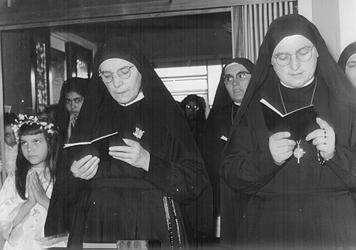Testimony of Sr. Rosaria Visco[1]
In September 1947, Maestra Thecla called me [to her office] and asked me to launch the cinema apostolate in collaboration with the Society of St. Paul.
Our work consisted of choosing films to reduce to 16mm. format so that they could be viewed in parish and public halls. It also consisted of setting up distribution agencies for these films and later making our own attempt to produce religious-educational, catechetical and formative films (also in collaboration with the SSP). Maestra Thecla frequently told me that we had to promote this apostolate vigorously and enthusiastically because the cinema, even more than the press, could do both good and bad, and we must use it to do good. She encouraged and advised us in our choice of films, strongly urging us to choose films that were genuinely worthwhile from the apostolic perspective, by which she meant films that would benefit humanity. She often said: “We must make good use of all the means that proclaim the message of Christ rapidly and effectively to as many people as possible.”
When Fr. Alberione wanted us to produce the film Mater Dei, Maestra Thecla was his most active collaborator and a big animator of the project. She was not only happy to allow many Daughters of St. Paul to take part in the production, duplication and diffusion of the film, but she even accepted the request to play the role of the prophetess Anna in it. She rejoiced at the thought that the Blessed Mother would be more greatly loved thanks to the film because she was convinced that through the cinema one could preach to thousands and hundreds of thousands of people.
Her zeal for the cinema apostolate also prompted her to support the production of a series of short catechetical films (50 in all) that were then dubbed in various languages. The project was anything but easy, but she never lost heart and continued to encourage us. Knowing that this initiative was very important to Fr. Alberione, she frequently said: “If Fr. Alberione wants it, it is a sign that it is the will of God.”
And she proceeded with the project with the decisiveness typical of a person who knows she is doing the will of God in the light of the Congregation’s apostolic charism. The financial needs [of the initiative] were many, but she never let them discourage or defeat her. Instead, she placed all her trust in God and urged us to have the same faith, “because,” she used to say, “the Lord knows that the instruments we use for the apostolate are costly, but if we make the most of them for the apostolate and by living in a spirit of poverty, we can be sure that his providence will never be lacking!”
She personally undertook a search for films and equipment suitable for the cinema apostolate and she studied all the possibilities for beginning this apostolate in other countries.
When Fr. Alberione wanted the Daughters of St. Paul to begin the writing apostolate by preparing catechism texts and by launching Così (a magazine for young women), Maestra Thecla did not hesitate. She had no doubts and she did not get discouraged. When she saw that the rest of us were sometimes downhearted, she would firmly remind us to have faith in God and in the grace of our vocation. If the going was hard because the trail we were blazing was completely new and far beyond our skills and training, she would say: “We must have faith…strong faith! And we must pray because prayer is our strength and God’s weakness.” She lived (and wanted us to live) the Secret of Success: “We see that we are very weak, ignorant, incapable and lacking in everything…. We trust in you alone, who said: ‘Whatever you ask the Father in my name, you will receive.’ …On our part we promise and oblige ourselves to seek wholeheartedly and in all things, only and always, your glory and peace to humanity. We trust that on your part you will give us spirit, grace, knowledge and the means for doing good….”
